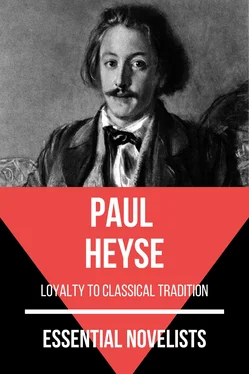"No; I have never gone so far. But when one has seen their pictures and the excellent photographs that we have now—but stop a moment if you please, I must show you something else."
They had just passed some high houses and reached a place, where a narrow, ditch-like canal, bridged where the street crossed it, emptied into the Spree. On one side stood the blank wall of a three-story factory. Opposite was a low hut, very narrow in front, but extending along the canal to a considerable depth. It seemed to have formerly opened upon the quay, by a door beside its single window, but the door was now walled up, and the window covered on the inner side by a dark cloth. This decaying little house was connected by means of an iron railing with its massive neighbor.
The artist leaned over the railing and gazed up the canal, whose dirty brown water flowed so sluggishly, that it seemed stagnant and gave forth a mouldering exhalation.
"Of what does this remind you?" he asked, turning to Edwin.
"What do you mean by 'this'?"
"Why, the canal, and yonder little bridge that connects the two banks, the post to which the clothes-line is fastened, and the atmospheric effect and coloring of the stones, which we artists call tone."
"It bears a distant, but by no means flattering resemblance, to Venice and the Bridge of Sighs."
"Right!" cried the little man, who in his earnestness, failed to hear the tinge of sarcasm in Edwin's remark. "True, I have not been in Venice myself. But friends of mine, who have visited Italy, have likewise been compelled to confess that this view was completely Venetian, at least as the city is represented in Canaletto's pictures, which, however, are doubtless somewhat cooler in tone, than the reality. However, we are in Berlin, and it is only a harmless jest when I talk of my lagune."
"Your lagune?"
"Certainly. I live here."
"In this—"
"Yes, in this hut: you need not swallow the word. To be sure it is not a doge's palace, this place where I have lived these twenty years, but I would not exchange it for all the splendor of the old sposo del mare, as the Venetians called their ruler. Besides, it is pleasanter within than its exterior would lead one to expect. The door which is now walled up, was formerly the entrance to a sailor's tavern, a wretched, dirty wine-shop, and behind it were a few miserable rooms, and a hole of a kitchen. Then came the stable and the wood-dealer's shed, whose timber-yard, as you see, adjoins our little house. I had just been married, and with all my treasures of hope and happiness, was but a poor devil, when the host of this inn was arrested by the police for concealing stolen goods and for other bad practices. The lumber merchant would not have another dram-seller on his premises, and the place was not exactly suitable for any one else. So I got it at a very low price, had the door walled up to admit the light into my studio from above, and though it has cost both toil and money to efface the traces of the dirty inn—you shall judge for yourself if we have not at last succeeded."
Taking the lead, he conducted Edwin through a large gate across the spacious timber-yard. A narrow lane led between the huge piles of odorous pine and beech wood, directly to the "hut," whose side view was no more aristocratic than the front.
"These six windows belong to me," said the artist with modest pride. Then he opened the low door and invited Edwin to enter.
The interior of the old barrack, apart from a certain gloom and dampness, really did look more comfortable than one would have thought possible from its exterior. An entry, painted in some light color, was hung with etchings in plain wooden frames. A door, opposite, appeared to open upon the canal.
"Turn to the right, if you please," said the artist, "the apartments on the left are our sitting-room, my daughter's little room, a kitchen, and a bed-chamber. Everything on the right belongs to art—according to my modest style, for I sleep in my studio, and even in my dreams I remain only the zaun-könig, and never fancy myself a Canaletto because I live beside a lagune."
As he concluded he opened the door of his studio.
Certainly the low room no longer showed any trace of having previously sheltered drunken sailors, but to have painted Claude Lorraine atmospheres there on gloomy days would have been a difficult matter. Two windows opened upon the canal and the dark chimney of the next house interposed itself between them and every ray of sunlight. At one of these windows stood a low table, covered with the various tools of a wood-engraver; at the other, a desk-like stand, before which sat a young girl, absorbed in her work. Just in front of her a bouquet of fresh flowers stood in a little vase, and she was evidently employed in copying into the wreath which she was painting on a porcelain plate, leaves and flowers from nature. On the walls hung all sorts of sketches, interspersed with finished pictures which, even at a distance, could not fail to be recognized as "genuine zaun-königs," while on an easel not far from the first window, stood a new half-finished landscape, over which the artist instantly spread a cloth.
"You must not see me too much in négligé," he said blushing. "I usually begin very awkwardly, and make a great many strokes on my little piece of canvas, before any clear outlines appear. But here is my daughter, Leah. She bears her mother's name. What are you going to say, my child? You will be pleased with me, for I have brought you something that you have long been wishing for."
At her father's first words the young girl had arisen, but, on perceiving the stranger she bowed modestly without moving from her place.
"I was not conscious, dear father, of having particularly desired anything," she now said, gazing in surprise at the merry, mysterious face of the little man, who seemed to be revelling in her perplexity.
"'Not a teacher, child?' this very learned Herr Doctor will not get to the end of his Latin as quickly as the good young lady. But he wishes to ascertain how far advanced you are, before saying whether he will give you lessons. Come, come, you need not be frightened. The examination won't kill you, even if you should be obliged to rack your brains a little now and then. Am I not right, Herr Doctor?"
The young girl, whose complexion was usually pale, crimsoned, and remained silent, as if uncertain whether to take the matter in jest or earnest. Edwin had time to observe her closely. She was taller than her father, with a firm, slender figure, and seemed to resemble him in nothing except the remarkably small size of her hands and feet. In the beautiful, but perhaps rather high forehead, or in the large, dark eyes which recalled her mother's race, there was no expression of cheerfulness; but with the exception of the eyes there was nothing Jewish in the face; the nose was perfectly straight, and the mouth possessed a certain sensual fullness, which softened the sternness of the other features. She had woven her thick black hair in braids, which she wore in a singular fashion, crossed under her chin, so that the pale oval face seemed set in a dark frame. A simple brown dress, worn, despite the prevailing fashion, without crinoline, completed the unusually grave appearance of the youthful figure.
At the first glance Edwin perceived that he had reason to congratulate himself on the prospect of having such a scholar.
"Your father was but jesting," he said smiling. "Of course there is no necessity for a thorough examination. On the contrary, if you can assure me, Fräulein, that you think yourself very ignorant, you shall be spared any further questions."
"Well, I will confess that!" laughed her father. "But you won't find fault with the little knowledge she has acquired from school-books."
"Not at all," replied Edwin, as he approached the young girl and looked at her work. "You see, Fräulein, I once had to teach a young lady, who, during the very first lesson, overwhelmed me with such a quantity of learning, had so much to say about cuneated letters, Egyptian mythology, besides relating various narratives about art and literature, that, beside her, I seemed to myself like a child just beginning its A, B, C. To be sure her wise little head was like a lumber-room, where articles for the most varied and opposite uses are stowed side by side without order or connection. But in her innocence she had no suspicion of the existence of anything like clearness and coherence, or cause and effect, in subjects and ideas. So I paid her and her mother the compliment of saying that I found it impossible to improve the young lady's education, and withdrew as speedily as possible."
Читать дальше












